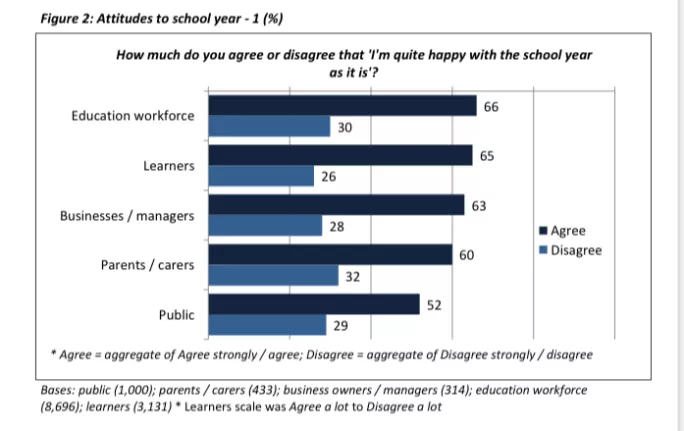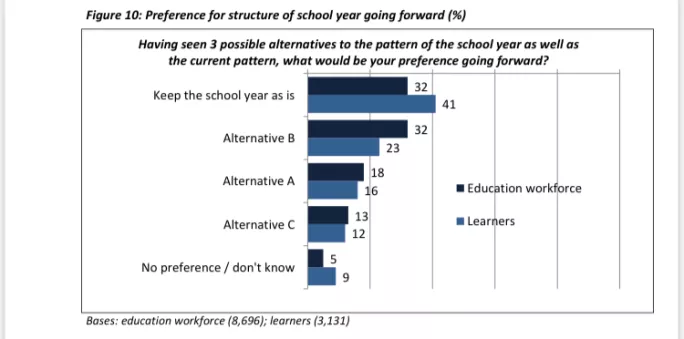Welsh teachers open to shorter summer holidays, research finds

New research commissioned by the Welsh government has found that “a slight majority” of the education workforce supports changing the way the school year is structured - with the most popular alternative to the status quo involving moving to five terms and reducing the summer holiday to four weeks.
The research also finds an overall ”openness to considering change” even though there are “broad levels of reasonable satisfaction with the shape of the current school year in Wales”.
Now the Welsh government has said it plans to bring forward a formal public consultation on the structure of the school year during the coming academic year - but it has ruled out reducing the overall amount of holiday staff and pupils receive or cutting the summer break to two or three weeks.
- Related: Wales’ plans for extending school day
- Long read: Should school holidays be rearranged
- Opinion: We can’t let them take away our summer holidays
- More opinion: We should have shorter holidays - but more of them
- Head’s view: October half-term - should it be two weeks?
The research into attitudes to the school year involved focus groups, interviews and a survey of more than 13,000 people - almost 8,700 of whom were education workers. That group included teachers and headteachers as well as governors and school support staff, such as caretakers and secretaries.
It found that 66 per cent of school staff agreed with the statement “I’m quite happy with the school year at it is”. A total of 30 per cent disagreed.

However, the research also found that when school staff were presented with alternatives to the current school year, they were more likely to support change than the status quo - which in Wales involves three terms of around 10 weeks, and a six-week summer break.
After being presented with three different models, roughly a third of school staff (32 per cent) said they wanted to retain the current rhythm of the school year, but 63 per cent opted for change.
The most popular change among school staff was “Model B” or “Alternative B”, which reduced the summer break from six to four weeks and introduced five terms of about seven to eight weeks. The model also involved a three-week Christmas break and three further two-week holidays in October, February/March and May.
Overall, 32 per cent of school staff backed this model - the same proportion that said they wanted to “keep the school year as is”.

The Beaufort Research report - titled Attitudes towards school year reform in Wales - said: “Headteachers and deputy headteachers surveyed were more likely to be in favour of change than heads of department/heads of year and teachers - only 27 per cent of heads wanted to keep the school year as is, compared with 39 per cent of heads of department/heads of year and 34 per cent of teachers.”
Reasons for backing Model B included the assertions that shorter terms would be “optimal for learning”; that a shorter summer could “help with learning loss” and that “the summer holiday weeks would be mostly in July when the weather was expected to be better than August”.
It was also highlighted that more regular two-week breaks “could help with teacher and learner burnout” and that returning to school earlier from the summer holidays would mean staff and learners were in school when exam results were published.
The report said: “It could therefore be easier to provide the required support mechanisms for learners, especially those entering higher education.”
However, the report also said that in the focus-group discussions, “a prominent theme” was that the six-week break allowed learners and the education workforce to recharge their batteries properly.
Other concerns included being out of sync with the school year in England, the impact on teachers’ terms and conditions, and the need for “compelling hard evidence” about why change to the school year was needed and what difference it would make.
One participant who worked in a school, and who took part in the focus groups, said that they would be “pilloried” if their decisions were not made “on the basis of hard evidence”.
The report said the results across all the different groups - the education workforce but also parents and carers, learners, stakeholders such as councils, and the public - indicated “broad levels of reasonable satisfaction with the shape of the current school year in Wales” but also “at an overall level, an openness to considering change”. It recommended “further engagement”.
Responding to the findings, Jeremy Miles, minister for education and Welsh language, said officials had been asked “to develop options to bring forward a formal public consultation during the next academic year”.
He added: “In our research and engagement over the past year, we have looked at a range of options, models and principles for change in order to test different and distinct structures for the school year, and to gather the widest range of views from learners, staff, families and the wider community.
“I am clear that there is no argument for changes to the overall number of holidays or for reducing the summer break to two or three weeks. However, I am pleased that the research published today demonstrates an openness to looking at the overall distribution of holidays throughout the year with a greater consistency in term lengths.”
In total, three models were put to survey participants. As mentioned, Model B proved most popular and gained the backing of 32 per cent of the school staff who participated in the survey.
The model that garnered the least support from school staff - Model C - involved six school terms lasting about six to seven weeks, broken up by holidays of two weeks, except over the summer when there would be a three-week break. Only 13 per cent of the education workers who took part in the survey supported this model.
The third model - Model A - which was backed by 18 per cent of the education workers surveyed - involved three school terms of about 13 weeks, with a one-week break halfway through. The summer holiday would be five weeks, instead of six, and schools would close for three weeks over Christmas.
You need a Tes subscription to read this article
Subscribe now to read this article and get other subscriber-only content:
- Unlimited access to all Tes magazine content
- Exclusive subscriber-only stories
- Award-winning email newsletters
Already a subscriber? Log in
You need a subscription to read this article
Subscribe now to read this article and get other subscriber-only content, including:
- Unlimited access to all Tes magazine content
- Exclusive subscriber-only stories
- Award-winning email newsletters
topics in this article



